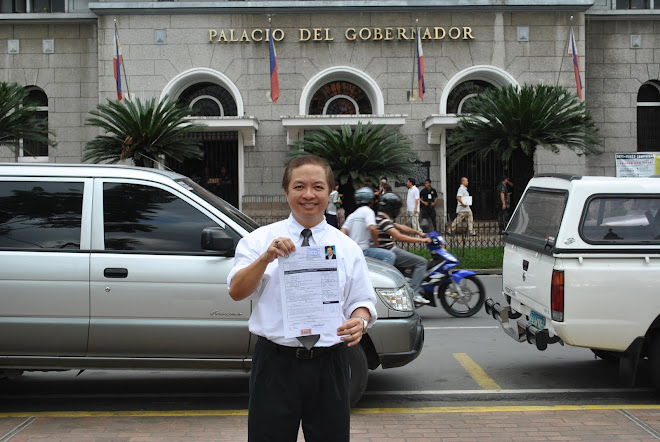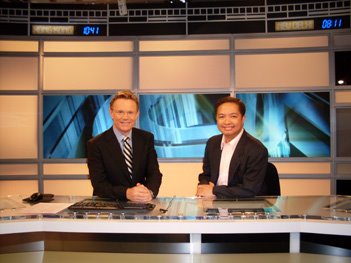Wednesday, April 28, 2010
RP polls bring feast then famine - Washington Post
By Jose Katigbak, STAR Washington bureau (The Philippine Star) Updated April 29, 2010 12:00 AM
WASHINGTON – Filipino politicians have one of the worst records in Southeast Asia for stiffing the poor, coddling the rich and indulging themselves, The Washington Post said.
A Post report from Manila by Blaine Harden said in an election season in the Philippines, the poor are inundated with “goodies” but the pre-election good times are almost always followed by post-election betrayal.
The need to do much for the poor is the primary talking point of 85,000 candidates running for 17,000 elective positions in the May 10 general elections, the newspaper said, and “it’s hard to keep track of all the incoming goodies.”
Traditionally, aid to the poor drops off after the vote.
The campaign slogan of presidential frontrunner Sen. Benigno Aquino is “without corrupt officials, there are no poor people,“ the report said, “but after 12 years in public office, he has little record of introducing legislation aimed at poverty reduction.”
As for Sen. Manuel Villar, Aquino’s main challenger, his slogan is: “End poverty once and for all.“
Villar says he understands poverty like no other candidate because he grew up in the slums and knows how to alleviate it, but his critics claim he became rich in part by using his political influence, the newspaper report said.
Many of the candidates employ the services of entertainment and sports celebrities to boost their chances at the polls. In the United States, Hollywood fame brings candidates no political fortune, The Washington Times reported.
It said a study by researchers at North Carolina State University found that celebrity endorsements by stars such as Madonna and George Clooney do not help political candidates and, in fact, can hurt them.
The Times said public annoyance with celebrities who leave the sound stage for the campaign trail has been detected elsewhere in the United States. The Philippine election campaign has attracted little attention in the US media primarily because the leading candidates in the presidential stakes are pro-American (hay nakuuu).
There doesn’t seem to be anything interesting about the election unless of course it doesn’t happen, said Walter Lohman of the Heritage Foundation.
“Now that would be a problem because the US definitely wants to see the elections proceeding and the results being honored,” he said.
Ernest Bower of the Center for Strategic & International Studies said the election was an important opportunity for the Philippines to emphasize one of its key competitive advantages – a democratic government.
“Let’s hope the race is well fought and won by the candidate receiving the most votes. The candidates who lose should support the new president and move on to support the country’s national interest,” he said.
(COMMENT: Need I say more?!? THIS IS PRECISELY ONE OF THE REASONS why I decided to run. But the COMELEC didn't like my application. So now, I'm boycotting this election... and so with the thousands more OFWs around the world. Here in Hong Kong, with about 100,000 workers, not even 10% had casted their votes. Matalino talaga ang mga OFWs. In Europe and U.S.? The same. Ganun din sa Asia-PAcific region. 'Di talaga paloloko ang OFWs!) 'Di na natoto ang Pilipino.
WASHINGTON – Filipino politicians have one of the worst records in Southeast Asia for stiffing the poor, coddling the rich and indulging themselves, The Washington Post said.
A Post report from Manila by Blaine Harden said in an election season in the Philippines, the poor are inundated with “goodies” but the pre-election good times are almost always followed by post-election betrayal.
The need to do much for the poor is the primary talking point of 85,000 candidates running for 17,000 elective positions in the May 10 general elections, the newspaper said, and “it’s hard to keep track of all the incoming goodies.”
Traditionally, aid to the poor drops off after the vote.
The campaign slogan of presidential frontrunner Sen. Benigno Aquino is “without corrupt officials, there are no poor people,“ the report said, “but after 12 years in public office, he has little record of introducing legislation aimed at poverty reduction.”
As for Sen. Manuel Villar, Aquino’s main challenger, his slogan is: “End poverty once and for all.“
Villar says he understands poverty like no other candidate because he grew up in the slums and knows how to alleviate it, but his critics claim he became rich in part by using his political influence, the newspaper report said.
Many of the candidates employ the services of entertainment and sports celebrities to boost their chances at the polls. In the United States, Hollywood fame brings candidates no political fortune, The Washington Times reported.
It said a study by researchers at North Carolina State University found that celebrity endorsements by stars such as Madonna and George Clooney do not help political candidates and, in fact, can hurt them.
The Times said public annoyance with celebrities who leave the sound stage for the campaign trail has been detected elsewhere in the United States. The Philippine election campaign has attracted little attention in the US media primarily because the leading candidates in the presidential stakes are pro-American (hay nakuuu).
There doesn’t seem to be anything interesting about the election unless of course it doesn’t happen, said Walter Lohman of the Heritage Foundation.
“Now that would be a problem because the US definitely wants to see the elections proceeding and the results being honored,” he said.
Ernest Bower of the Center for Strategic & International Studies said the election was an important opportunity for the Philippines to emphasize one of its key competitive advantages – a democratic government.
“Let’s hope the race is well fought and won by the candidate receiving the most votes. The candidates who lose should support the new president and move on to support the country’s national interest,” he said.
(COMMENT: Need I say more?!? THIS IS PRECISELY ONE OF THE REASONS why I decided to run. But the COMELEC didn't like my application. So now, I'm boycotting this election... and so with the thousands more OFWs around the world. Here in Hong Kong, with about 100,000 workers, not even 10% had casted their votes. Matalino talaga ang mga OFWs. In Europe and U.S.? The same. Ganun din sa Asia-PAcific region. 'Di talaga paloloko ang OFWs!) 'Di na natoto ang Pilipino.
Subscribe to:
Comments (Atom)









